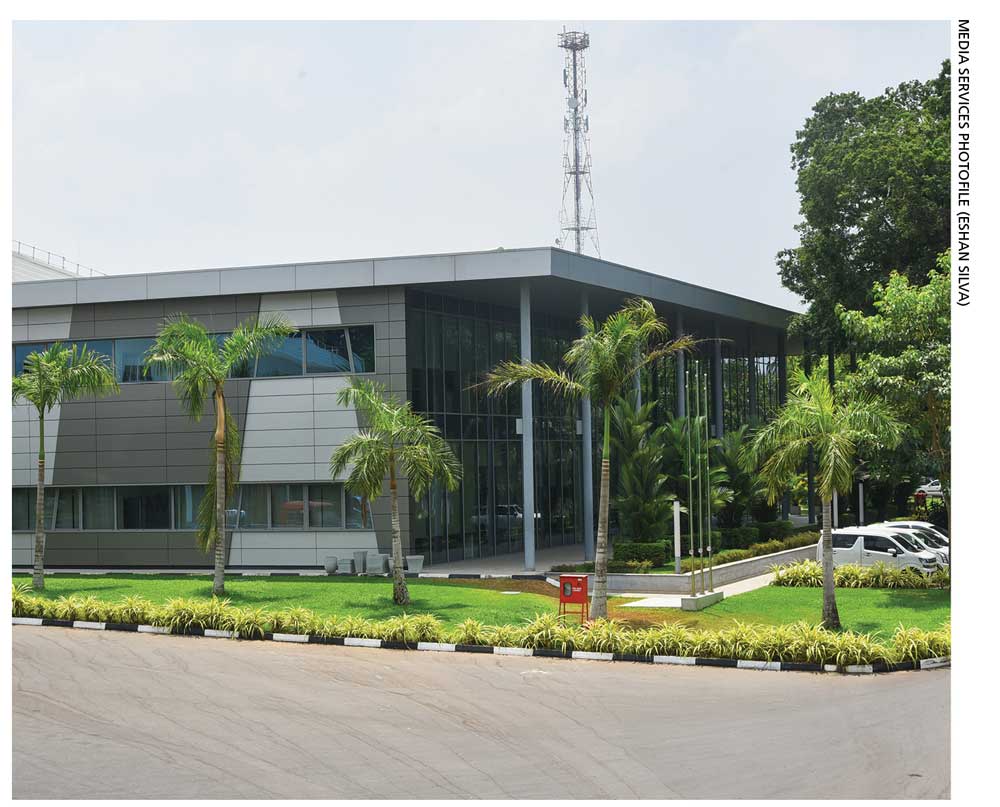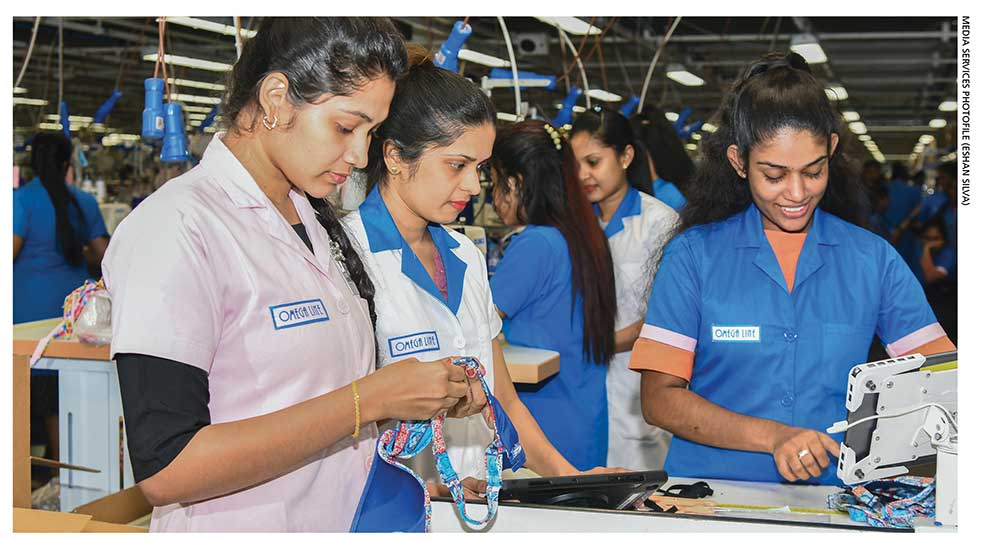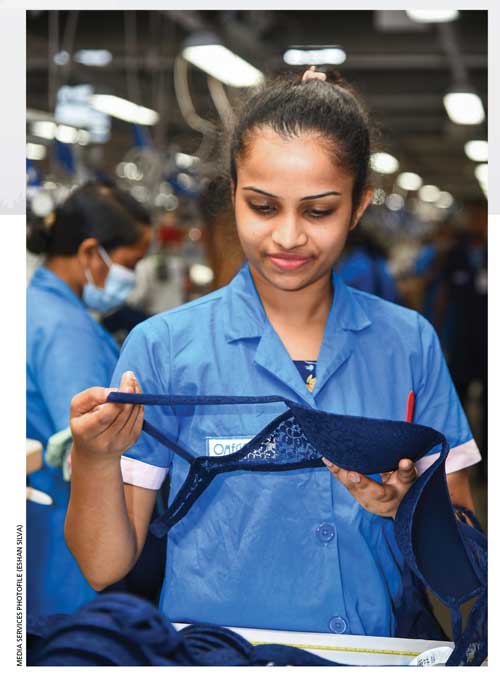OMEGA LINE

Chief Executive Officer
Managing Director
Q: Can you shed light on Omega Line’s parent company and its investments in Sri Lanka?
A: Omega Line – incorporated in Sri Lanka in 1998 and operational since 1999 – is part of the Calzedonia Group (now known as Oniverse) in Italy. The Calzedonia Group has made substantial investments in Sri Lanka, totalling over US$ 350 million. Omega Line is the flagship entity with six additional factories having been established over the years.
Sirio was established in Badalgama in 2002, focussing on basic underwear and beachwear production, followed by a T-shirt specialised factory in 2005 under Omega Line.
In 2007, the acquisition of a factory in the Polgahawela Export Processing Zone led to the formation of Alpha Apparel, which comprises two factories. The expansion continued in 2008 to Benji, focussing on bra and brief production, in addition to a section that produces bra cups.
And in 2013, Omega Line expanded into Vavuniya, employing over 2,700 individuals, marking the largest investment in the northern region.
This strategic expansion demonstrates Omega Line’s commitment to growth, diversification and geographic outreach, underlining its position as a key player in the apparel manufacturing industry in Sri Lanka.
Q: Could you provide more details on Omega Line’s production capabilities and product range?
A: Omega Line boasts impressive production capabilities and a diverse product range, contributing significantly to its status as a leading apparel manufacturer. With over 100 million garments shipped by Omega Line alone and close to 200 million garments shipped by the group as a whole last year, the company demonstrates its substantial production capacity.
In terms of financial performance, Omega Line and its affiliated factories achieved approximately 575 million dollars in revenue, reflecting a robust contribution to the company’s overall revenue stream.
Its product portfolio includes fashion garments like bras, briefs and beachwear, complemented by collaborations with several subcontractors for items such as pyjamas, night dresses and T-shirts.
With a workforce of around 4,500 employees internally and over 15,000 across affiliated factories, Omega Line emphasises its formidable presence in the industry, combining internal resources with strategic partnerships to meet market demand effectively.

Q: What measures has Omega Line taken to ensure the sustainable sourcing of materials for its lingerie production, given the environmental and social impact of materials like cotton, synthetics and dyes?
A: Omega Line is dedicated to sustainability, aligning with initiatives like the Paris Agreement, and transitioning to organic fabrics for lingerie production to minimise environmental and social impacts.
Moreover, Omega Line is committed to achieving renewable energy targets set by its parent company, aiming for a full transition to renewable energy by 2030. In Sri Lanka, Omega Line has already taken significant steps towards this goal by incorporating solar power into its operations.
The installation of solar panels at its new factory covers approximately 40 percent of the energy requirement and there are plans to expand solar infrastructure across other plants.
Additionally, the company prioritises energy efficiency by investing in low power consumption machinery and transitioning to LED lighting in all factories.
Water management includes recycling wastewater for gardening and toilets.
These efforts showcase Omega Line’s holistic approach to sustainability, covering environmental conservation, energy efficiency and responsible water management.
Q: And what specific CSR initiatives has Omega Line implemented to give back to the communities in which it operates?
A: Omega Line demonstrates a strong commitment to CSR by actively engaging in initiatives to uplift the communities in which it operates.
It supports education by building schools and sponsoring programmes, aids healthcare by supplying essential drugs and actively engages in environmental awareness.
The company’s commitment to sustainability extends to its operations, reflecting its dedication to minimising its environmental footprint.
Its workforce of over 90 percent females underscores women empowerment. Omega Line has also been recognised as a ‘Great Place to Work,’ and ranks among the top 15 companies in the production and manufacturing sector.
Omega Line was recently honoured with a Best Corporate Citizen award by the Ceylon Chamber of Commerce for its outstanding contributions to economic development, empowering rural economies, providing employment opportunities, supporting small businesses and engaging in charitable work.
Over the years, Omega Line has been involved in several significant projects aimed at community development and support. These initiatives include the construction of tsunami housing, a vocational training centre in Murunkan and a three storey building for a nearby school.
Omega Line has provided accommodation and training facilities for approximately 150 tsunami victims. The company has also contributed to infrastructure projects such as public roads, further enhancing the communities in which it operates.
Omega Line also partnered with the Italian embassy and diocese of Chilaw in providing training to unemployed youth in Italian language skills as well as caregiver courses. Nearly 100 persons trained in this category were able to find a caregiver job in Italy.

Q: What’s your assessment of the country’s economy and its impact on your industry?
A: Despite facing significant challenges – including the aftermath of the Easter attacks, onset of the COVID-19 pandemic and subsequent economic downturns – Omega Line has demonstrated resilience and adaptability in navigating through these difficult times. While the wider industry grappled with uncertainties and disruptions, the company managed to weather the storms relatively unscathed.
While the broader apparel industry in Sri Lanka faced a 20 percent decline in exports and currency appreciation issues, Omega Line was able to achieve turnover growth last year. The appreciation of the Sri Lankan Rupee exacerbated challenges for companies, particularly regarding production costs and wage benefits.
On the other hand, the current reversal in currency trends presents fresh hurdles as companies now face mounting production costs.
Despite hurdles, the company remains dedicated to innovation and sustainability, determined to thrive amidst evolving economic conditions.
Q: What should be done to establish and strengthen trade relationships between Sri Lanka and Italy?
A: Before Omega Line’s establishment by Calzedonia in Sri Lanka, Italian investments were scarce with only a small socks factory operating in the Katunayake zone. However, over 75 percent of investments in Sri Lanka now originate from Calzedonia, indicating its significant impact on the country’s investment landscape.
Several factors limit the flow of investment from Italy and other countries, including a lack of proactive efforts by foreign embassies, macro-environmental issues such as a low ease of doing business index and policy inconsistencies, and the removal of tax incentives.
Despite these challenges, there’s potential to attract investments in industries like the production of vehicle parts and electronic items.
Omega Line’s success with Calzedonia demonstrates Sri Lanka’s production capabilities, and the need for effective marketing by organisations like the Board of Investment (BOI) and foreign embassies to attract foreign direct investments (FDI). With concerted efforts, Sri Lanka could become a preferred FDI destination, leveraging its strengths in the global market.
Q: How has your organisation adapted to the local market over the years?
A: Omega Line benefits from the unwavering support of its parent company, which has a deep-rooted belief in the potential of Sri Lanka. Over the years, this belief has been substantiated by the country’s ability to exceed expectations. Notably, when Omega Line was established 25 years ago, the parent company had around 300 sales outlets in just a handful of countries.
Fast forward to the present day and the Calzedonia Group boasts an extensive global presence with over 5,500 sales outlets spanning 55 countries, generating a turnover of nearly US$ 3.5 billion dollars.
The portfolio of brands under the Calzedonia Group includes renowned names such as Calzedonia, Intimissimi, Tezenis, Falconeri, Antonio Marras and Atelier Emé. This expansive network and diverse brand offerings reflect the remarkable growth and success of the group over the years.
Overall, the synergy between Omega Line and its parent company underscores a shared vision for growth, sustainability and excellence in the apparel industry.

Q: Can you share your organisation’s brand philosophy for its Sri Lankan operations?
A: Calzedonia’s success story stems from its strategic approach to filling a market void, and maintaining a steadfast commitment to quality and innovation. Recognising a gap in the market where consumers struggled to find products that aligned with their expectations in terms of design, quality and affordability, Calzedonia sought to address this need by providing superior offerings.
The company’s emphasis on Italian design, synonymous with fashion and style, further differentiated its products in the market.
By establishing operations in Sri Lanka, Calzedonia leverages local talent and skills while investing in cutting-edge technology to enhance productivity and maintain excellence.
Collaboration between its Sri Lankan operations and the parent company fosters continuous improvement, setting standards for the apparel industry.
Similarly, Omega Line maximises efficiency and cost savings through internal production capabilities, manufacturing essential accessories and materials.
This collaborative approach has proven successful, with Calzedonia benefitting from Sri Lanka’s capabilities in quality manufacturing while simultaneously contributing to the development of the local workforce and industry.
 Similarly, Omega Line maximises efficiency and cost savings through internal production capabilities, manufacturing essential accessories and materials.
Similarly, Omega Line maximises efficiency and cost savings through internal production capabilities, manufacturing essential accessories and materials.
This strategic approach not only enhances operational flexibility but also stimulates economic growth and development, benefitting local communities and industries in Sri Lanka.
Our collaboration with local manufacturers and subcontractors has significantly contributed to the development of Sri Lanka’s economy. Originally reliant on imports for raw materials such as fabric, poly bags and labels, the company has transitioned to sourcing approximately 44 percent of its raw materials locally.
This shift not only enhances the country’s self-sufficiency but also provides a significant economic advantage by supporting local industries and creating employment opportunities.
The impact of Omega Line’s operations extends beyond its direct activities, particularly in rural areas where most of its factories are located. The presence of these factories has stimulated economic activity, leading to infrastructure development and the emergence of ancillary services, such as transportation, food suppliers and cleaning services.
This ripple effect has provided a substantial boost to the economies of these villages, generating employment and improving living standards for local communities.
Omega Line’s commitment to local sourcing and collaboration with subcontractors have not only strengthened its own operations, but also played a pivotal role in fostering economic growth and development at both the local and national level in Sri Lanka.
In conclusion, we can say that while our brands are focussed on customers to give them an unforgettable experience each time they visit a shop or when wearing our garments, Omega Line’s focus similarly goes beyond the expectations of all stakeholders with a special emphasis on maintaining a satisfied and highly motivated workforce.
Telephone: 031 4879000 | Email: reception@omegaline.org | Website: www.calzedoniagroup.com




